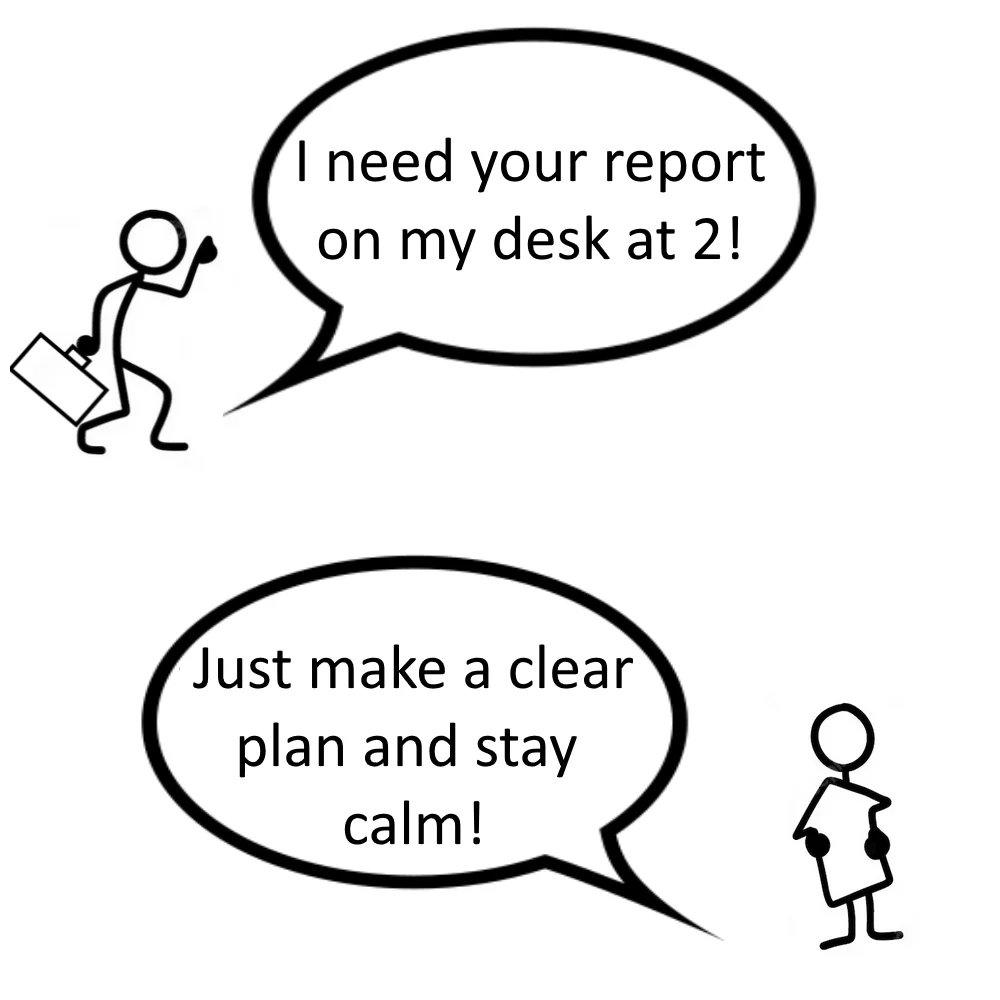
Resilience: How To Manage Stress

A certain amount of stress is normal. Life doesn’t always go as you want it to.
Being stressed for a short period will improve your performance.
However, ongoing chronic stress can have serious implications for your physical and mental well-being.
In order to be resilient and effectively manage life’s ups and downs, you need to learn how to manage your stress and look after your physical and mental health.
This is a key skill and one that we cover in our Resilience courses!
Practical Stress Management
As many as 70% of adults in the United States admit to feeling stress and anxiety daily, and so there is plenty of research on ways to manage your stress levels.
The trick is to figure out what works for you.
1. Plan Your Day
Planning your day will give you a sense of control and purpose. It will help you to get away from the feeling of just fighting fires all day long.
Learn time management and the importance of planning is a great place to help get your stress under control.
2. Diet
Maintain a balanced, healthy diet. Make sure you are drinking sufficient water.
Avoid excessive caffeine and sugary snacks. They may give you temporary relief in the form of an energy boost, but the crash will come and leave you feeling more tired.
A healthy diet will give you the energy you need to keep going.
3. Exercise
People who exercise regularly are less likely to experience stress and anxiety.
Being physically active has a very good impact on both our physical and mental health.
All exercise helps, whether it’s a walk around the block, a bike ride, or a trip to the gym.
Regular exercise will help you to keep your energy up and your stress levels low.
4. Sleep
Stress can make sleep more difficult. Sleep can make you find difficult situations even more stressful.
Some people can get into a vicious circle of poor sleep, leading to more stress and even poorer sleep.
If you are having a difficult time, it is important to make time for sleep.
Much like sugary snacks, cutting back on sleep is a short term strategy that will ultimately make things more difficult, not less.

5. Social
A study finds that people with few social connections are more likely to suffer from anxiety and depression.
If you are having a tough time, don’t cut yourself off from others.
Spending time with others is a great way to manage your stress.
It is even better if you know them well enough to discuss the issues that you’re facing.
Ask them for their advice. Most of the time, just talking about the issue out loud will help reduce the anxiety and stress.
6. Write It Down
What is it that’s getting you stressed? Many people find that writing things down, or journaling, actually reduces their stress.
It stops their mind from spinning and allows them to keep things in proportion.
Take a pen and
1- Identify why it is that you’re stressed.
2- Write out three sensible ways to deal with the root cause of your stress.
3- Start immediately on the solution that you think is most likely to work.
7. Beware Zoom Burnout
Working from home can mean lots of video calls.
Zoom burnout is real and you need to manage it.
Keep an eye on your calendar and decline invitations if you feel that you’ve just got too many calls in a day.
8. Relaxation Techniques
Learning to use relaxation techniques is vital to help you through very high-stress days.
Many of these techniques are well known. The challenge is applying them consistently.
Methods we would recommend looking at are:
1- Meditation
2- Deep Breathing
3- Laugh
4- Listen to Motivational And Uplifting Music
5 – Develop A Gratitude Practice
Why It’s Important To Manage Stress
Mismanaged stress can lead to all sorts of issues, both mentally and even physically!
When you are constantly stressed, you can suffer from Adrenal Fatigue!
Adrenal Fatigue
Stress puts the body into an alarm state, and without time to properly relax, your body will adapt to constantly be in this state. This will cause an adrenal “burn out” which can then lead to:
-
- Insomnia + constant tiredness
- Clouded thinking
- Migraines and headaches
- Burnout
- Aches and pains throughout the body!
How To Build A Stress Management Habit
Now we know just why you need to manage your stress, let’s get some advice on how you can get into the habit of managing your stress levels.
Work-Life Balance
Make sure you allocate enough time to take care of yourself! And make sure when you finish work, you finish work. Don’t double-check your e-mails, don’t worry about your next day or any upcoming issues, and take your time to relax!
Keep The Schedule!
Once you figure out your work-life balance, make sure you keep to it every day for a few weeks! Habits take time to build. Say you have a lot of work to do one day, and you decide to work into the evening, all the work you have put in will be taken back, and your body will readjust to the extra stress you are putting it through!
Communicate!
If you are too stressed in your work, speak to a colleague or HR about the issues you are having! Make sure someone there knows the difficulties you are facing, so you can take advantage of the facilities they may have in place to support you.
Outside of work, communicate with your friends and family, make sure you aren’t keeping your issues to yourself. Keeping your stress in your own head is a very easy way to let it build up and get worse!
Conclusion
Managing your stress levels is vital if you want to perform at a high level.
Taking 30 minutes daily to do so is a very wise investment. It will make you far more resilient to lifes ups and downs.
Image credit: Pexels.


